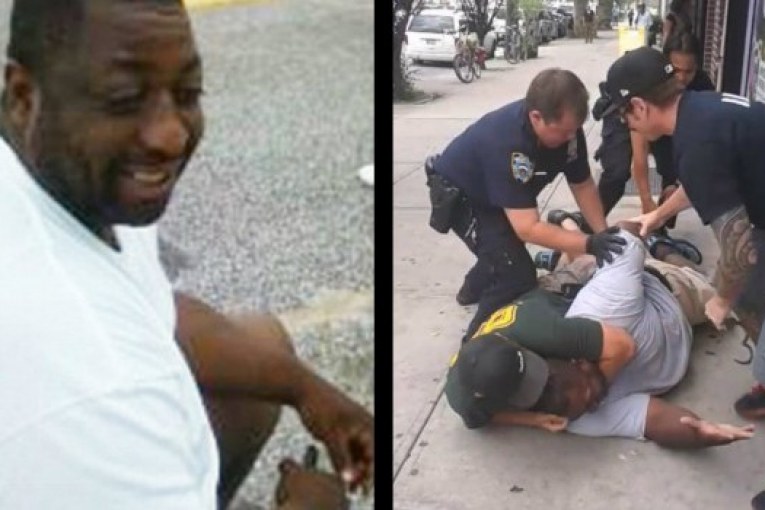

by the Daily Appeal
“Five years ago, my son said ‘I can’t breathe’ 11 times as officers placed him in a banned chokehold and killed him. After patiently waiting, following the rules, hoping for accountability and closure, we now learn that the Department of Justice has decided not to bring federal charges against Officer Daniel Pantaleo.
“The DOJ has killed Eric all over again, and today we are the ones who are finding it difficult to breathe.”
This was Gwen Carr, Eric Garner’s mother, writing in the Daily News about the pain of yet another decision yesterday that offers no accountability for her son’s death. Garner died on July 17, 2014, on a Staten Island sidewalk, when Pantaleo, an NYPD officer, placed him in a chokehold. A medical examiner ruled Garner’s death a homicide. The years since then have been marked by an official eagerness to describe Garner’s death as a tragedy (as the U.S. attorney for the Eastern District of New York did again yesterday in his announcement about the DOJ decision) and a failure to do much else. Pantaleo has remained on the force, earning about $120,000 a year, including overtime.
Garner’s last, haunting words five years ago have echoed across the country since then, representing the violence that people, especially Black and Latinx people, face at the hands of police officers. As they mourned, Garner’s relatives also had to wonder if there would be any consequences for the officer who took his life. To date all that has happened is that Pantaleo has been placed on desk duty—“a slap on the wrist, if that,” Carr wrote. (In May, the Daily Appeal looked at the physical chokehold that killed Eric Garner and at a now-lifted Arizona corrections department ban on a book by law professor Paul Butler that  examines the chokehold as a metaphor for state violence against Black men.)
examines the chokehold as a metaphor for state violence against Black men.)
The DOJ announcement was a blow, yet not a surprise.
Garner’s family, supporters, and community activists were offered hope in 2014 when the Department of Justice announced an investigation into Garner’s death and Pantaleo’s actions immediately after a grand jury declined to indict Pantaleo on the charges chosen by the Staten Island district attorney.
But for the next four and a half years, a contest within the DOJ over whether Pantaleo should be charged played out. Over the course of two presidents (Barack Obama and Donald Trump) and four attorney generals (Eric Holder, Loretta Lynch, Jeff Sessions, and William Barr), prosecutors with the office of the US Attorney for Eastern District of New York and civil rights prosecutors in Washington disagreed. Finally, Barr reportedly weighed in and the decision was made.
After yesterday’s announcement, Carr and Garner’s daughter Emerald Garner have again trained their attention on the officials who can still act to hold Pantaleo accountable for his death: New York City Mayor Bill de Blasio and NYPD Commissioner James O’Neill.
“The NYPD failed us. Mayor de Blasio failed us. And now the DOJ has failed us,” Carr wrote. “But we aren’t going anywhere and we will not be silenced. We are asking Police Commissioner James O’Neill to fire Pantaleo and all of the officers responsible for Eric’s death. They all must be off the force.”
Emerald Garner came out of the courthouse yesterday, “convulsing with pain,” as the New York Times editorial board wrote yesterday.
“Y’all watched him kill my father,” she said. “Fire him.” She spoke of the death of her sister, Erica Garner, who fought for accountability for their father’s death.
For five years, there has been the—steadily diminishing—possibility that Pantaleo would face either charges or disciplinary consequences for his actions. In the immediate aftermath of Garner’s death the initial focus was on the Staten Island district attorney and grand jury. When the grand jury failed to indict, attention went to federal prosecutors. As the years went by, and as Trump was elected, it seemed increasingly unlikely that there would be a federal case. Yet for as long as the possibility remained it gave city officials a way to punt.
The city blamed its own inaction on the federal investigation, explaining that it had to await the DOJ’s decision before pursuing disciplinary charges against Pantaleo. It was only in May, four and a half years after the DOJ announced that it would investigate, that the police department initiated disciplinary proceedings.
Now, with the DOJ’s decision, that case is officially the last avenue for accountability. The administrative judge’s decision is pending but the final decision rests with the commissioner who can either dock Pantaleo vacation days or fire him.
The New York Times and Daily News editorial boards weighed in after the DOJ decision, calling for Pantaleo to, finally, be removed from the force.
As the Daily News editorial board wrote in a piece published this morning:
“The long and inexplicable delay under two administrations underlines the inanity and insanity of the NYPD waiting and waiting and waiting before finally initiating what should have been a simple disciplinary case.”
The New York Times editorial board wrote: “Why should an officer like Officer Pantaleo remain on the force, diminishing the trust of New Yorkers?
“The Justice Department’s delay is inexcusable.
“The city’s deference to federal prosecutors, and lack of urgency, are offensive.
“That Officer Pantaleo could remain on the force, after everything, seems unimaginable.”
